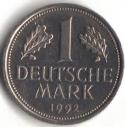– 19% Of Germans Say They Would Vote For Anti-Euro Party (ZeroHedge, April 22, 2013):
In what may come as a shock to an otherwise quiet Germany, which has hardly seen any of the vocal (and actionable) “Euroskepticism” prevalent among its smaller peripheral neighbors, Handeslbslatt reports that a whopping 19% of Germans have said they would vote the anti-euro party Alternative for Germany (AFD). This means Bernd Lucke’s party, which appeared as if out of nowhere, has succeeded in taking Germany by storm, and is likely that his success and prominence will merely convert even more people on the fence about Europe’s future to those demanding a Deutsche Mark return. And while the AFD has yet to pose a direct threat to Merkel’s ruling CDU coalition which has 36.7% of the vote five months ahead of elections, recall that everyone ignored Beppe Grillo as a mere sideshow weeks before his blistering performance to nearly win the Italian election in February.All that would take for another surge in the Euroskeptic’s popularity is another summer of economic discontent and contraction: precisely the kind that is shaping up for Europe for the fifth year in a row.
From Handelsblatt, Google translated:
The new anti-euro party alternative for Germany (AFD) has a good chance to collect in autumn in the Bundestag. The result of a representative survey of online market research company market research on behalf of Handelsblatt Online. 19.2 percent of the 1,003 respondents affirmed therefore the question of whether they would give the party their vote in the general election (24.9 percent of men and 14.8 percent of women).
Their greatest potential voters, the party in the 31 – to 45-year-olds. 19.3 percent of this age group would give their vote for the AFD (in the 18 – to 30-year-olds: 14.2 percent, at the 46 – 65 year olds: 23.1 percent).
54.6 percent of respondents (56.7 percent of men, 53 percent of women) would not choose the AFD on the other hand, 26 percent of respondents stated that they have not made a choice decision (18.4 percent of men, 32.2 percent of women).
In its election manifesto, the AFD calls for “orderly resolution of the euro area”. Of the respondents this requirement is viewed critically. In particular, the projects that Germany gets out of the euro and return to the D-Mark, hardly find supporters. 37 percent of respondents want to return to the Deutsche Mark (35.9 percent of men, 38 percent of women). In contrast, 63 percent of respondents are in favor, stick to the euro (64.1 percent of men, 62 percent of women).
On the Handelsblatt prediction markets , the other parties to which the “alternative for Germany” were heard on Sunday at 25 percent – the beginning of the year there were just over three percent, the strongest party was the CDU with 30.5 percent. Together with the FDP (6.2 percent) they would to 36.7 percent. SPD (20 per cent) and the Greens (10.4 per cent) are significantly behind with a total of 30.4 percent. The Left Party would have to fear about 5 percent for a place in the Bundestag.
The prediction markets shows recent changes in opinion very quickly, because there will be traded continuously. On the platform, participants can trade the parties in the general election as a virtual shares. Behind this is the following idea: in the share price, the different personal expectations of participants about the performance of the parties incorporated. At the end of the game is a payoff equal to the result of the parties in the general election.
According to a survey by the polling institute YouGov on behalf of “time-line”, the AFD has its greatest potential voters in previous FDP and the Left Party voters. 35 percent of those who voted for the Left in the 2009 parliamentary elections can imagine, therefore, to vote in the fall for the AFD. Under the FDP voters, there are 33 percent of Union and SPD voters 18 per cent, with the Greens voters 16 percent.
Total imagined even 27 percent of the Germans to choose the new party, according to the YouGov survey. But only three percent would give the AFD with certainty their voice when on Sunday would be parliamentary elections. When Allen Bach is, although almost a fifth of the population could imagine to support the party again, the AFD achieved in the concrete choice intentions so far only one to two percent.

Anyone else remember the rise of the Nazi party when economic pressures on the people got too terrible? I am not saying this is the same, but economic travail breeds demigods. There is no way Germany, or any nation, can underwrite the debt created by the Enron Accounting masters of the world. The debt level all over Europe, Japan, Russia, China and the US exceeds world money supplies thousands of times over. It is insanity. The bankers have to be shut down, again.
I always hoped one time I would never have to live through was an era similar to the 1930s, yet here we are.